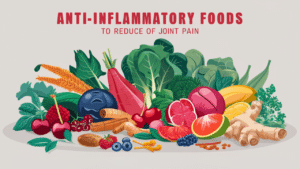Joint pain can be a debilitating condition affecting millions of people worldwide. While medications and physical therapies are common treatments, diet also plays a crucial role in managing and reducing inflammation. Incorporating anti-inflammatory foods into your diet can help alleviate joint pain and improve overall joint health. In this article, we will explore various foods that can help reduce inflammation and ease joint discomfort.
Understanding Inflammation and Joint Pain
Inflammation is a natural response of the body’s immune system to injury or infection. However, chronic inflammation can lead to a variety of health issues, including joint pain. Conditions like arthritis, gout, and other inflammatory disorders often result in persistent joint discomfort. By including anti-inflammatory foods in your diet, you can help control inflammation and reduce pain.

Top Anti-Inflammatory Foods
1. Fatty Fish
Fatty fish such as salmon, mackerel, sardines, and trout are rich in omega-3 fatty acids. These healthy fats have potent anti-inflammatory properties that can help reduce joint pain and stiffness. Omega-3s decrease the production of inflammatory compounds, thereby providing relief from conditions like rheumatoid arthritis.
2. Turmeric
Turmeric contains curcumin, a compound known for its powerful anti-inflammatory and antioxidant effects. Regular consumption of turmeric can help reduce inflammation and joint pain. Adding turmeric to your meals or consuming it as a supplement can be particularly beneficial for people with arthritis.
3. Berries
Berries like strawberries, blueberries, and raspberries are loaded with antioxidants, vitamins, and minerals. These fruits contain anthocyanins, compounds that reduce inflammation and protect the joints from damage. Incorporating a variety of berries into your diet can help keep your joints healthy.
4. Olive Oil
Extra virgin olive oil is a staple of the Mediterranean diet and is known for its anti-inflammatory properties. It contains oleocanthal, a compound that has similar effects to non-steroidal anti-inflammatory drugs (NSAIDs). Using olive oil as a cooking oil or salad dressing can help reduce joint inflammation.
5. Leafy Greens
Leafy greens such as spinach, kale, and collard greens are rich in vitamins and antioxidants that fight inflammation. These vegetables contain high levels of vitamin E, which helps protect the body from inflammatory cytokines. Incorporating more leafy greens into your meals can aid in reducing joint pain.
6. Nuts and Seeds
Nuts and seeds, including almonds, walnuts, chia seeds, and flaxseeds, are excellent sources of healthy fats, protein, and fiber. They are also high in omega-3 fatty acids and other anti-inflammatory compounds. Regular consumption of nuts and seeds can help reduce inflammation and support joint health.
7. Garlic and Onions
Garlic and onions are known for their immune-boosting properties and contain sulfur compounds that inhibit the production of inflammatory chemicals in the body. Adding these flavorful ingredients to your meals can help reduce inflammation and joint pain.
8. Green Tea
Green tea is packed with antioxidants, particularly epigallocatechin-3-gallate (EGCG), which has powerful anti-inflammatory effects. Drinking green tea regularly can help reduce inflammation and protect joint cartilage from damage.
9. Tomatoes
Tomatoes are rich in lycopene, a powerful antioxidant that reduces inflammation. Cooked tomatoes, in particular, provide higher amounts of lycopene. Including tomatoes in your diet, whether raw or cooked, can contribute to reducing joint pain.
10. Ginger
Ginger has been used for centuries as a natural remedy for inflammation. It contains compounds like gingerol that have anti-inflammatory and analgesic effects. Consuming ginger tea or adding fresh ginger to your dishes can help alleviate joint pain.
Tips for Incorporating Anti-Inflammatory Foods
- Balanced Diet: Ensure your diet includes a variety of anti-inflammatory foods to maximize their benefits.
- Fresh and Whole Foods: Opt for fresh, whole foods rather than processed items that can exacerbate inflammation.
- Cooking Methods: Use healthy cooking methods such as steaming, grilling, and baking to preserve the nutritional value of foods.
- Hydration: Stay hydrated by drinking plenty of water and herbal teas.
- Regular Meals: Eat regular, balanced meals to maintain stable blood sugar levels and prevent inflammation.
FAQs:
Q1. What are the best foods to reduce joint inflammation?
Fatty fish, turmeric, berries, olive oil, leafy greens, nuts and seeds, garlic and onions, green tea, tomatoes, and ginger are among the best foods for reducing joint inflammation.
Q2. How does turmeric help with joint pain?
Turmeric contains curcumin, which has strong anti-inflammatory properties that help reduce joint pain and inflammation.
Q3. Can green tea help with arthritis?
Yes, green tea contains antioxidants like EGCG that have anti-inflammatory effects, which can help reduce arthritis symptoms.
Q4. How often should I eat anti-inflammatory foods to see benefits?
Incorporating anti-inflammatory foods into your daily diet can provide continuous benefits. Aim to include a variety of these foods regularly for the best results.
Q5. Are there any foods that can worsen joint pain?
Yes, processed foods, sugary snacks, red meat, and foods high in trans fats can increase inflammation and worsen joint pain.
By incorporating these anti-inflammatory foods into your diet, you can effectively reduce joint pain and improve your overall joint health. Remember, a balanced diet, along with regular exercise and proper hydration, is key to maintaining healthy joints and reducing inflammation.
